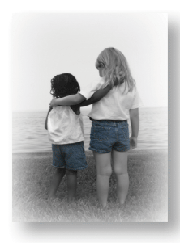We often apply our social conscience in regard to our proximity to a "ground zero." This proximity could involve our links of relatives, of space, or of any belief or commitment. For example, if we choose to stand against drug abuse, we may have lost a loved one to overdose (relative); we many have dealers living in our neighborhood (space); or we may belong to an anti-drug abuse group (belief). In any case, the closer we are to the problem, the more likely our conscience is telling us to "get involved."
This "proximity" response is natural and powerful. Of course, many great accomplishments could not have occurred without those in or very near problems. These individuals add experience and understanding that only they could provide. But, what about those without close proximity? What, if anything, stirs the will of these people to participate?
This is a question that constantly haunts activist groups. Call nonparticipants the "silent majority" or the "as long as it doesn't affect me personally" crowd. Everyone knows strength resides in numbers, yet to motivate the numbers who have little proximity to the problem is extremely difficult. Unlike Christian baptism or being born again, no outside impact of immersion or intervention sets upon new converts to convince them to follow a good cause. The negative will of a distant person is usually stronger than the power of positive persuasion. So, the dedicated few are often left to do the work of the many.
Even heroes change. As Hollywood reminds viewers that the line between good and bad is often blurry, the "good guys" don't always wear white. Roy Rogers, John Wayne, and Gregory Peck have given way to Robert De Niro, Joe Pesci, and Al Pacino. Influences of fiction, unfortunately, have lead to false and distorted reality. And even in reality, we see idol worship of notorious people like Lindsay Lohan and Chris Brown.
We (those with reasonable minds) know we should offer ourselves to good causes and work to attract others to these worthwhile efforts; however, we just aren't convinced that our personal efforts will have any affect on ground zero. Some actually believe things will "take care" of themselves. So, far from the impact of the explosion, we sit, offer a half-concerned ear at times, and wait until the enemy infiltrates our backyard to do anything. By then, forces of evil have scored another victory and loom larger than ever.
The power of the voice, of the pen and, particularly, of the hands is infinite. Not one individual has ever reached even close to potential without pushing the envelope of his/her understandings. Those without proximity to a need must discover their own reason to react. The act of discovery is extremely difficult for most. Many young hands had to touch the "burner" before heading the warning of those with scars.
We would do well to examine issues, causes, and actions of life and death. We comprehend priorities but often displace them because pleasure and fun drive us toward personal satisfaction instead. Then, suddenly, something does occur that rattles our brains into action -- usually this event has proximity. Life or fate may deal us a sad hand. How many times do we attend a viewing or a funeral and tell our closest relatives and friends, "Good to see you, but I hate our meeting has to happen under these circumstances." Closeness draws the masses once again.
Actively contributing to make our area a better place, one less plagued by drug abuse, is essential. Ask those whose proximity has put them into the fight. As a community, we desperately need more distance from the reality of drug abuse and the main ingredient that will make this possible is the involvement of those who are willing to walk toward the fire. The background is no place for an activist. We all know that.
Toward the Fire - Ground Zero




No comments:
Post a Comment